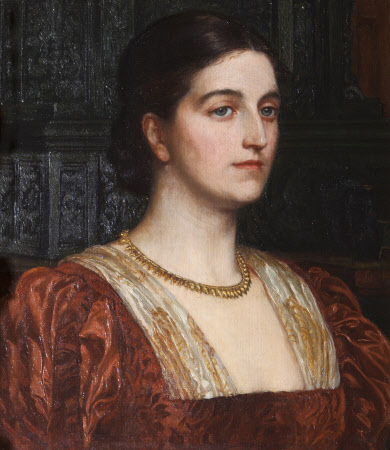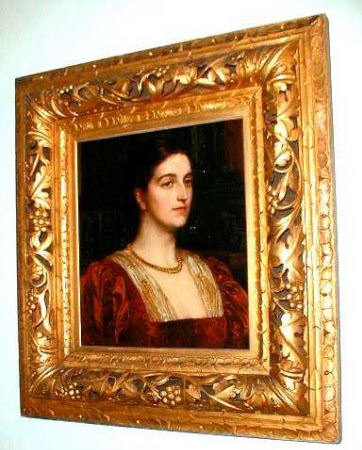Lady Adelaide Chetwynd-Talbot, Countess Brownlow (1844-1917)
Edith Corbet (c.1850 - 1920)
Category
Art / Oil paintings
Date
1885 (monogrammed and dated)
Materials
Oil on canvas
Measurements
780 x 720 mm
Place of origin
England
Order this imageCollection
Belton House, Lincolnshire
NT 436037
Summary
Oil painting on canvas, Lady Adelaide Chetwynd-Talbot, Countess Brownlow (1844-1917) by Edith Corbet (c.1850-1920), signed with monogram and dated 1885. Bust-length portrait of a young woman, turned to the right, gazing to the right, wearing a brown dress and white and gold bodice. The sitter was the daughter of Henry John Chetwynd-Talbot, 18th Earl of Shrewsbury and Lady Sarah Elizabeth Beresford. She married Adelbert Wellington Brownlow Cust, 3rd Earl Brownlow (1844-1921), son of John Hume Egerton, Viscount Alford and Lady Marianne Margaret Compton, on 22 June 1868 at Ford Castle, Northumberland. She died on 16 March 1917 at age 72 at 8 Carlton House Terrace, London, England, after a long illness, without issue.
Full description
Various descriptions of Lady Brownlow's appearance have survived; one, from Mrs Gladstone in 1875 of the Countess apparently wearing the dress seen in the Leighton portrait 436073: '...at teatime today in white embroidered with gold regular toga sort of thing, and tonight with red beads, white handkerchief on her head. Oh lovely." In 1893 Lady Paget described Lady Brownlow as the 'most beautiful of three sisters, every one of them the salt of the earth. She was seated between Lady Lothian and Lady Pembroke, the former in trailing black and the latter in trailing white draperies. Lady Brownlow was in sober grey of the same make, and they looked like the Three Fates. They all asked questions in high-pitched voices." * Lord and Lady Brownlow were considerable patrons of the arts; he was a trustee of the National Gallery and was responsible for commissioning George Frederic Watts to make a memorial statue to Tennyson in Lincoln; together they were patrons of the Home Arts and Industries Association, with which Mr and Mrs G F Watts, John Ruskin, William Morris and William de Morgan were also involved, and the object of which was to provide artistic work for the poor and disadvantaged. It was in one of their houses that Lord Charles Beresford coined the sobriquet ‘The Souls’, for the intellectual and aristocratic coterie amongst which they moved. Lady Brownlow died in 1917. (Both of these accounts of Lady Brownlow are quoted from Jane Abdy and Charlotte Gere's The Souls, 1984, pp 164-5)
Credit line
Belton House, The Brownlow Collection (acquired with the help of the National Heritage Memorial Fund by the National Trust in 1984)
Makers and roles
Edith Corbet (c.1850 - 1920), artist

